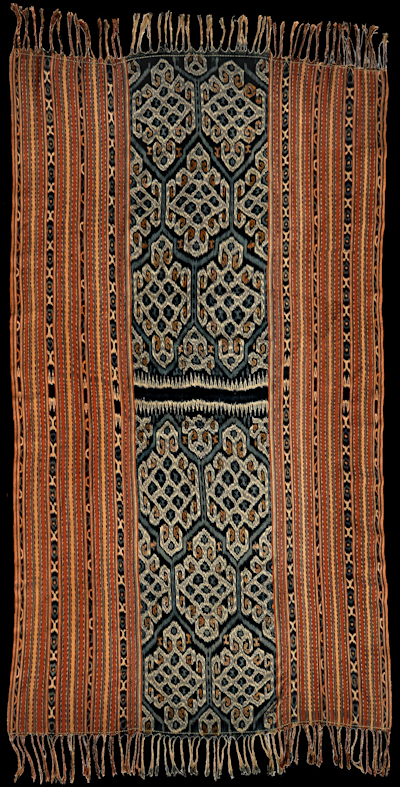| |
363 Timor, West Timor
Mau naek (men's wrap)  
|
| Locale: | Amanuban |
| Period: | 1925-1940 |
| Yarn: | Cotton, hand-spun, medium, multiple weave types |
| Technique: | Warp ikat |
| Panels: | 3 |
| Size: | 107 x 185 cm (3' 6" x 6' 0") LW: 1.73 |
| Weight: | 905 g (31.9 oz), 457 g/m2 (1.50 oz/ft2) |
| Design: | The cloth's construction with a large main ikated panel and narrower ikated bands in the side panel is common in Amanatun, but ikating in more than one colour, a technique called lepat huma, is not, whereas it is often done in Amanuban. The main ikated motif, the diamond shape with curling hooks, called 'kai nanan', is also typical for Amanuban. |
| Comment: | The main panel was executed in twin warp, single weft, the ikated bands in the side panels in single warp, single weft. The plain bands were done mostly in single warp, single weft. The selvedges were finished with white complementary warp which creates a ribbed effect. Lightly corded fringes. |
| Background: | Chapters on Timor and West Timor. |
| Compare: | 159 312 |
| Sources: | Information on origin and patterning provided by James Izacc Bill Key Kase. Yeager & Jacobson identify the motif as 'flying bird', a variant of kaif (2002: Fig. 98). In the same work another mau is shown from Napi village in Eastern Amanuban, with a similarly pronounced outline around the main motifs. |
| |

©Peter ten Hoopen, 2025
All rights reserved.
|


